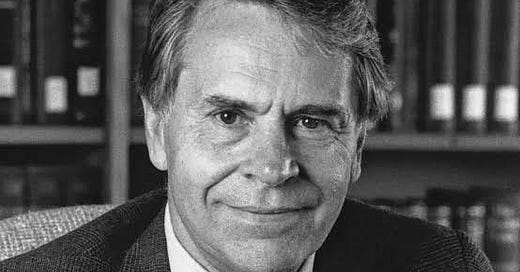If Truth Social Is Worth $8 Billion, MAGA Ain't "Populist."
It's free to join Truth Social, the Pravda of MAGA, yet nobody wants to. It's expensive to buy stock in Truth Social, the Pravda of MAGA, yet everybody wants to. Discuss.
Christopher Lasch.
For some time now a quiet battle has been waged over the nature of populism.
The still-dominant view, which we might call Hofstadterism, after the late historian Richard Hofstadter, is that populism is a toxic force in American politics informed by bigotry, anti-intellectualism, and paranoia. The Hofstadterist view, if reduced to a bumper sticker, would be: Populism Bad, Progressivism Good. By “Progressivism” I refer not to the soft-on-Communism Progressive Party of Henry Wallace in 1948, nor to the folks who today call themselves “progressives” to situate themselves to the left of liberalism. Rather, I refer (and Hofstadter referred) to the Progressive Movement of the early 20th century, which was the forerunner of what today we call liberalism.
The rising view, which we might call Laschism, after the late historian Christopher Lasch, is that populism is a salutary force in American politics informed by class consciousness, democratic values, and a well-placed suspicion of corporations. The Laschian view can be reduced to: Where Do You Think Those Fancy Progressives Got All Their Best Ideas? Which probably is a little too long to fit on a bumper sticker. (For a cogent articulation of the Laschian view, read this 2020 Chris Lehmann review of the Library of America’s Richard Hofstadter volume. Lehmann was a protégé and student of Lasch’s.)
Both sides are basically right, with the added difficulty that if you identify more, as I do, with the Progressives, you’re obliged to overlook the fact that many Progressives (including, I’m sorry to report, the co-founder of the magazine I write for, The New Republic) embraced the racist pseudoscience of eugenics. I’m a Hofstadterist partly because Hofstadter was a gifted writer who is much more fun to read than Lasch, and partly because nothing labelled “populist” during my lifetime has ever seemed appealing. The Birchers were populist. The My-Country-Right-or-Wrong supporters of the Vietnam War were populist. The people who supported George Wallace’s candidacy for president in 1968 were populist. The tough-on-crime pro-Nixon Silent Majority was populist. The 1978 California Tax Revolt was populist. The Reagan Revolution was populist. The Moral Majority was populist. Jimmy Carter’s election in 1976, which I very much favored, carried a mild whiff of populism, but that didn’t last.
Is Donald Trump a populist? If you’re a Hofstadterian who equates populism with demagogy, you say yes. If you’re a Laschian who equates populism with being anti-business, you say no. I’ve leaned toward calling Trump a populist because he’s a demagogue; because his appeal so clearly resembles that of George Wallace; and because he’s so successfully driven college graduates out of the Republican Party. It’s difficult, when observing today’s MAGA-captured Republicans, to put out of your mind Hofstadter’s much-quoted 1964 essay, “The Paranoid Style in American Politics.” On the other hand, behind all Trump’s regular-guy minstrelsy the billionaire former host of The Apprentice pursues pretty single-mindedly the political agenda of the United States Chamber of Commerce on taxes and regulation, departing only with regard to trade (and even there his bark is much worse than his bite).
The public offering this week for Truth Social, Trump’s money-losing social media platform, adds ballast to the Laschist view. As a product, Truth Social (and, by extension, MAGA) is an abject failure, having lost half its monthly active users over the past year. But as a financial instrument, Truth Social (and, by extension, MAGA) is a runaway success, what Wall Street calls a “meme stock.” In my latest New Republic piece I observe that “If there’s a political science term to describe a movement in which people are more willing to invest than participate, it certainly isn’t populism.” Score one for Christopher Lasch. You can read the piece here.




